



























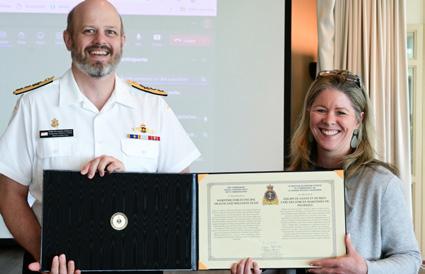

The award stated:

“Since its creation in 2012, the Maritime Forces Pacific Health and Wellness Team has served the Formation and led Royal Canadian Navy initiatives over the past decade. This robust team of 90 personnel have prioritized five key areas: active living, addiction-free living, healthy nutrition, organizational wellness, and mental and social wellness. Many of these Formation initiatives have been adopted throughout the Navy and Canadian Armed Forces, including top fuel menus for Fleet Diving Unit (Pacific), the Healthy Nutrition Environment Policy, and the creation of the cannabis policy posters. Their promotion of health, wellness, and positive space awareness programs on behalf of the Maritime Forces Pacific Defence Community have made enormous contributions to the overall physical and mental well-being of Royal Canadian Navy personnel.”
Signed by CRCN, Vice-Admiral Angus Topshee
The crew of HMCS Esquimalt and their family are in the thoughts and prayers of Victoria’s military community.
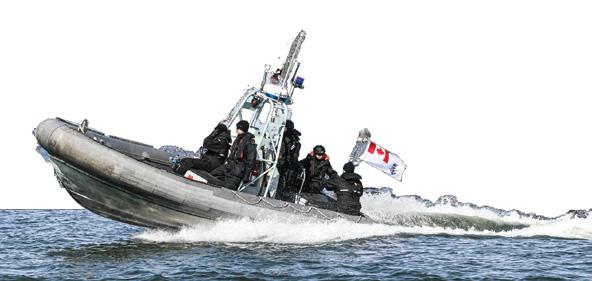
A memorial service in the ship’s namesake city on Apr. 16 at Memorial Park paid tribute to the last Canadian warship lost in the Second World War and the 39 crew who died in the attack, 78 years to the day of the tragedy.
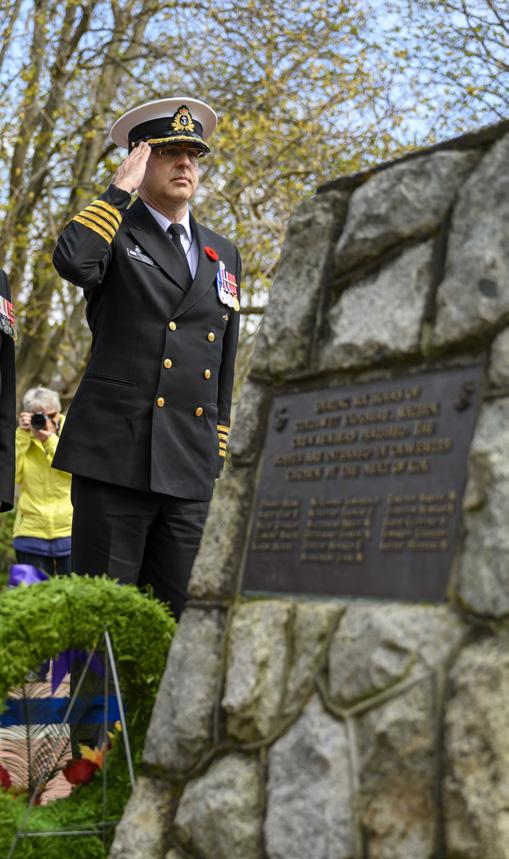
“That HMCS Esquimalt went down within the view of Halifax reminds us the Second World War did not just happen over there,” said LCdr (ret’d) Gerry Pash. “Of the 24 Royal Canadian Navy (RCN) ships lost during the Second World War, 11 went down in went down in Canadian and Newfoundland waters and some in the St. Lawrence River, only a few hours’ drive from Quebec City.”
Many of those serving on board the dieselpowered Bangor-class minesweeper were members of the Royal Canadian Navy Volunteer Reserve (RCNVR), emphasized Pash, the ceremony’s emcee.
Esquimalt was on anti-submarine patrol, five miles off Chebucto Head on the morning of Apr. 16, 1945. The ship was struck by a torpedo fired from German Submarine U-190. The attack occurred just three weeks before the end of the war in Europe.
An article on the website of the CFB Esquimalt Naval and Military Museum entitled Within Sight of Shore by historian
Robert C. Fisher gives a gripping blow-by-blow account of the attack. The author recalls how “poor sonar conditions off Halifax made the detection of submerged or bottomed U-Boats difficult at the best of times.”
Only 27 of the minesweeper’s 71 crew survived.
Lieutenant (Lt) Robert MacMillan of the RCNVR, Esquimalt’s Commanding Officer, had orders to carry out their patrol and then rendezvous with HMCS Sarnia off Chebucto Head. Naval intelligence reports showed that a U-boat lurked in the approaches to Halifax, but had said the same for months without any definite sign of the enemy.
The torpedo hit the Esquimalt at 6:30 a.m. ripping a hole in the ship’s starboard quarter. The crew scrambled into four deployed lifeboats, crowding in with as many as 15 to a raft. While Esquimalt sank in just four minutes, survivors of the attack endured six hours in the frigid water before rescue arrived notes Fisher.
An aircraft flew overhead of the wreckage just ten minutes following the attack but spotters had mistaken the Carley floats for fishing boats. An attempt by the Post War Signal Station to reach Esquimalt by radio had failed and initially did not raise alarm bells until a second failed attempt at 9:30 a.m., writes Fisher. The survivors were eventually rescued by HMCS Sarnia and a light ship nearly three hours later.
Sixteen crew died from exposure while desperately clinging to lifeboats or holding on to its side and treading water.


This year’s memorial ceremony included the playing of the national anthem by the Naden Band, and performances of the Last Post, Rouse, and God Save the King. An Act of Remembrance and Commitment to Remember was also done with the placing of wreaths at the park’s Cenotaph.
Pash, a former Citizenship Judge and Public Affairs Officer of the Royal Canadian Navy helped organize this annual event. Dignitaries attending this year’s ceremony included Esquimalt Mayor Barb Desjardins, Base Commander, CFB Esquimalt Capt(N) J. Jeffrey Hutchinson and Chief Petty Officer First Class (CPO1) Al Darragh, Base Chief.
Pash noted how 2023 marks the 100th Anniversary of Canada’s Naval Reserve and how many members of Esquimalt were members of the RCNVR.
“These are the stories of ports of call, shipmates, the boredom of shipboard life, the storms of the North Atlantic, of living and serving together in damp small ships with the constant threat of enemy submarines, of how ordinary men did extraordinary things in a time of national crisis,” said Pash. “No other warship has carried the name of HMCS Esquimalt since, so it is with grateful hearts that we must never forget the sacrifice of those who gave their today for our tomorrow.”
For more information about HMCS Esquimalt visit the CFB Esquimalt Naval and Military Museum webpage at navalandmilitarymuseum.org/archives/articles/ship-histories/ hmcs-esquimalt
Following Dr. Gunderson’s presentation on March 16 for The International Day for the Elimination of Racial Discrimination on “Micro-interventions”, Dr. Gunderson would like to offer an additional Question & Answer period on April 25 from 10-11am for those who attended.

Please bring questions or challenging situations that have come up around racism in any aspect of your life. Come when you can and leave when you need! April

Passcode:
Please contact me if you have any questions: Claire.Grant@forces.gc.ca or (250) 363-1900 Ext 60283!
MANAGING EDITOR
Jazmin Holdway jazmin.holdway@forces.gc.ca
EDITOR
Kate Bandura
250-363-3130 kateryna.bandura@forces.gc.ca
WRITER
Peter Mallett mallett.peter@cfmws.com
PRODUCTION
Life insurance has many purposes. Primarily, insurance looks after your family or dependents if you’re no longer there to provide for them.
Teresa Laird
250-363-8033 production@lookoutnewspaper.com
Leslie Eaton
250-363-8033 workstation3@lookoutnewspaper.com
ACCOUNTS /RECEPTION

Trina Winters
ADVERTISING
Joshua Buck
250-363-3127
778-977-5433 sales@forcesadvertising.com
EDITORIAL ADVISORS
Lt(N) Michelle Scott
Rodney Venis
250-363-4006
250-363-7060
Published each Monday, under the authority of Capt(N) J. Jeffrey Hutchinson, Base Commander.

Le LOOKOUT est publié tous les lundis, sous l’égide du Capv J. Jeffrey Hutchinson, Commandant de la Base.
The editor reserves the right to edit, abridge or reject copy or advertising to adhere to policy as outlined in PSP Policy Manual. Views and opinions expressed are not necessarily those of the Department of National Defence.
Le Rédacteur se réserve le droit de modifier,de condenser ou de rejeter les articles, photographies, ou annonces publicitaires pour adhérer au Manuel des politiques des PSP. Les opinions et annonces exprimées dans le journal ne réflètent pas nécéssairement le point de vue du MDN.
Circulation - 2,000 plus 300 pdf downloads per week





Follow us on Facebook, Twitter and Instagram to join our growing social media community.
A Division of Personnel Support Programs
CFB Esquimalt, PO Box 17000 Stn. Forces, Victoria, BC V9A 7N2 Web: www.lookoutnewspaper.com


Fax: 250-363-3015
Canadian Mail Product Sales Agreement 40063331




The amount of insurance you need depends on many factors, including your occupation, lifestyle, income, assets, debts, the needs of your dependents, and affordability. Insurance needs are unique to the individual and may change as your life circumstances change. Only an insurance advisor can help determine what’s right for you.


Here are some of the things they will consider.
What you do in your day-today career is a consideration for insurers. Canadian Armed Forces members have an element of risk in their occupations, which is considered when determining the best insurance policy for you and your families. SISIP Financial offers life insurance policies with no exemptions for war and dangerous occupations.
You may also have some employee benefits in place. Your insurance advisor can help you find the best policy to match your occupational needs and complement the coverage you have through your employer.
Life can be adventurous, and you’ll want a policy that takes into account your pastimes. Maybe you’re a boating enthusiast, or you like rock climbing. Perhaps you spend your time off touring on allterrain vehicles or snowmobiling. Insurance is a risk mitigation tool and you can choose coverage that takes into account your active lifestyle. Life insurance through SISIP Financial supports your lifestyle and offers policies that don’t exclude dangerous hobbies or occupations.
If something happens to you, you don’t want your family to struggle to pay money owing. A mortgage is often one of the biggest debts people carry. You may also have student loans, a line of credit or a car loan. When determining how much coverage you need, these are top factors. If you have a $200,000 mortgage, a $15,000 student loan and owe $8,000 for your car, your policy will ideally cover that $223,000. Keep in mind that mortgage insurance will pay off the amount owing to the bank, while a life insurance policy pays your beneficiaries.
If you’re the primary provider for your family, income replacement is an important consideration when determining your coverage.
Depending on the individual and myriad factors that you can discuss with your advisor, a general rule is to consider five to ten years of salary replacement. If you earn $50,000 annually, you may choose a policy that offers $250,000 to $500,000 in income replacement.
Insurance is intended to cover financial loss in the event of a death. If you have dependents, they can be added to a policy as a rider to cover basic funeral costs, but they may not require the same level of coverage.
Life insurance policies are customized to the individual. As you choose your coverage, your insurance advisor can also help you select an affordable premium that works with your monthly budget.
Depending on the type of policy you choose, insurance can be included as part of your investment portfolio.
Contact your local SISIP Advisor, Chris Fraser, to review your insurance needs.

We kind of know when the right time is, sometimes we’re sort of ready for it, but can we ever be certain?
Deciding when to see a counsellor is slightly different from going to see a doctor. Typically, you see your doctor because something with your health needs immediate attention. Even though there has been traction with the importance of mental health at large, it is difficult to gauge when one should seek help.




Deciding to seek mental health support isn’t as easy as waking up one day and looking in the mirror, and saying, ‘Hmm… today seems like a good day to get my head checked out’. There is a process to making that choice. Sometimes, the route to making that decision is almost instantaneous, but sometimes that decision is comprised of an arduous internal war.
Still, there are four common considerations one can make.


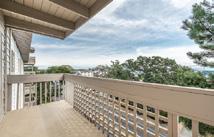



RATIONALITY.
At times, what concludes our inner debate of whether or not we should go to counselling is being able to build up a case cognitively to justify it. Making the decision to go to therapy is no small feat. Sometimes, the mental gymnastics we perform would win us a gold medal at the Rationality Olympics. ‘I don’t have time’, ‘My issues aren’t big enough’, ‘Once I start working on myself, I’ll have to commit to changing’ and ‘I’m just not ready yet’ have all been deployed successfully at one point in time. It is why strictly using rationality to decide to come to therapy is often not enough, especially if one wants it to be successful CHECKING IN
Questions to ask yourself:
• Is my body functioning to a level where I am capable of attaining my goals?

• Are there nagging injuries that have caused me to doubt my body?
• Am I providing my body with the nourishment it needs?
Undoubtedly, we all, at some point, lose trust in our bodies, whether through injury or sickness, etc. This ultim ately deepens the fracture between mind
and body. Nevertheless, if we begin to notice our mind is resenting our body, it may be a good time to bridge that gap.
If your partner, friends, or colleagues mention how negative you’ve been lately, it may be time to reflect on those insights. For better or worse, people are generally pretty good at picking out your faults. Additionally, if you find yourself isolating, or maintaining your connections in a healthy manner is becoming a chore, it may be beneficial to see how you can bring some life back into those relationships. INTUITION.
Intuition is an odd one as we still don’t fully understand how it works. Yet, we get this ineffable message that something is up. This hunch is instinctive in nature and precludes conscious reasoning. Sometimes, intuition is the first to ring the alarm when something is out of sorts. However, it is often pushed out by rationalization. Checking in with this element is vital when making a sound decision.
There is no right answer to the question of ‘when should I go to therapy?’, and I hazard to say it should even be seen through this perspective. Rather, it should be evaluated on whether it makes sense or not for you. By considering these four elements, you should have a decision you're confident in. Just like it makes sense to go see a doctor when you’re sick, it should make sense to go seek help for your mental health.



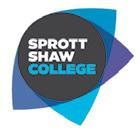


The United Way Period Promise Research Project involving 1,600 people in B.C. shed light on how period poverty is impacting their lives:
• Approximately 51 per cent indicate they had struggled to purchase a menstrual hygiene product for themselves.





• 26 per cent of respondents indicated they had gone through a period without having menstrual products available to them.
• Not having access to menstrual products is an isolating factor: 18 per cent indicated they had missed school, 22 per cent work, 29 per cent community events and 27 per cent social events when they didn’t have access.

• Nearly 75 per cent of respondents indicated that having access to products at community organizations allows them to be more engaged in their community.









-Source: United Way, Lower Mainland
on, encouraging friendly competition between the Royal Canadian Navy’s two bases in Halifax and Esquimalt.
The gauntlet will determine which base can raise the most donations of menstrual hygiene products during the month of May. The civilian co-chairs of the Defence Women’s Advisory Organizations (DWAO) of Maritime Forces Pacific (MARPAC) and Maritime Forces Atlantic (MARLANT) issued the challenge last week during a Microsoft Teams meeting.
Donation boxes for menstrual hygiene products including pads, tampons and panty liners, menstrual cups and period panties, will be set up at strategic locations in Esquimalt and Halifax to support the United Way’s Period Promise Campaign. The contest begins May 1 and concludes on May 28, coinciding with World Menstrual Hygiene Day.
“There is definitely some trash talking going on by both sides but there is no hiding from the truth as the ‘Best Coast’ is about to defeat the beast of the East,” said Vanessa Nicholson, event organizer for the Maritime Forces Pacific (MARPAC) DWAO.
Holly Scothorn, Civilian Co-Chair for Maritime Forces Atlantic (MARPAC), begged to differ.



“No question, Halifax is going to win because Atlantic Canada is known to be super generous and much better at making charitable donations than the West,” she countered.
The losing side will pay a bigger price than finishing in second place. As part of the challenge, the losing DWAO will be forced to toss their group’s military Champion into the cold waters of Halifax or Esquimalt Harbour. In Halifax, Captain (Navy) (Capt(N)) Jonathan Lafontaine has been put on notice that he may take the plunge into the not-so pristine waters of Halifax Harbour, while in Esquimalt, Capt(N) Peter Sproule is counting on the donations to avoid the chilly waters of the Pacific.



All good-natured trash talking aside, period poverty is a very serious issue, Scothorn and Nicholson agree.

school,” Scothorn said.
“Our combined efforts with this contest are to shed more light on a very serious health problem with far-reaching effects,” added Nicholson.
The numbers don’t lie, Nicholson said, pointing to a recent study by the United Way of the Lower Mainland of B.C. Its Period Promise Report found that 51 per cent of 1,600 people surveyed struggled to purchase a menstrual hygiene product for themselves, while 26 per cent indicated they gone through a period without having menstrual products available. A recent poverty study in the Halifax Regional Municipality (HRM) revealed approximately 20,000 women are experiencing poverty and also face the same difficulties in purchasing menstrual hygiene products.
“People miss school or leave work, and too many face the additional challenges of homelessness, living with a disability because of Period Poverty,” she said. “It isn’t easy to ask for help or know where to find it.”
Scothorn has run a Period Poverty campaign at CFB Halifax for the past four years. She collected over 13,000 menstrual hygiene products during her first year of operation but noted the impact of the COVID19 pandemic and members working remotely reduced contributions from the previous years.
Nicholson established her campaign in Esquimalt in 2021 and managed to collect 11,307 products when her first campaign wrapped up in May 2022. She is confident those numbers will increase this time around.

“Once we educate people about the seriousness of the issue, they need little convincing to get on board and help spread the word about the dire need,” Nicholson said.
Products collected at CFB Esquimalt during this year’s campaign will be donated to national non-profit Soap For Hope who is handling distribution for this year’s United Way campaign.

For more information about period poverty and the United Way’s Period Promise visit Period PromiseUnited Way British Columbia (uwbc.ca)
"...period poverty acts as a barrier to many things for many people such as attending work or school."Vanessa Nicholson, Co-C hair of the Defence Women’s Advisory Group, displays donations for this year’s Period Poverty Product Campaign. Photo: Peter Mallett/Lookout.


HMCS Carleton
Canada’s Naval Reserve history is full of courage and sacrifice. As part of the Naval Reserve Centennial, we are proud to commemorate our heritage and the legacy left by those before us, including the trailblazing women of the naval reserve force who proved to the country, and themselves, their ability to serve with distinction, laying the foundation for greater gender equality in the Canadian Armed Forces.
Oh merry, oh merry, oh merry are we; For we are the girls of the King’s Navy.
When Canada’s Naval Reserve volunteer force was established in 1923, women were not included. It took a global conflict nearly 20 years later for the Navy to realize the value women bring to the service.
The Royal Canadian Navy’s (RCN) ships which fought for Canada and for freedom during the Second World War (1939-45) were crewed not only by Regular Force officers and sailors, but also by wartime volunteers. These volunteers were the men of the Royal Canadian Naval Volunteer Reserve (RCNVR), as well as the Royal Canadian Naval Reserve (RCNR), comprised primarily of professional sailors by trade.
Canada’s wartime naval Volunteer Reserve force at peak strength was 78,000 strong. Along with this legion of men, however, was another notable group of citizen sailors which bolstered Canada’s naval contribution to the war effort: the Women’s Royal Canadian Naval Service (WRCNS).
The WRCNS was a separate service, the members of which enlisted for the duration of hostilities, making it a reserve force. Established in July 1942, the WRCNS began recruiting women to serve in shore-based trades thus freeing men for active duty at sea. By the time it was disbanded in August 1946, nearly 7,000 Canadian women had served as ‘Wrens’ with the WRCNS.

The WRCNS interacted with Naval Reserve Divisions (NRD) across the country. From a tactical point of view, the responsibility of recruitment and enlistment fell largely to reserve units. Here many women first connected with the Navy, other than those with relatives already serving, a reason why many women chose to enlist in the senior service.
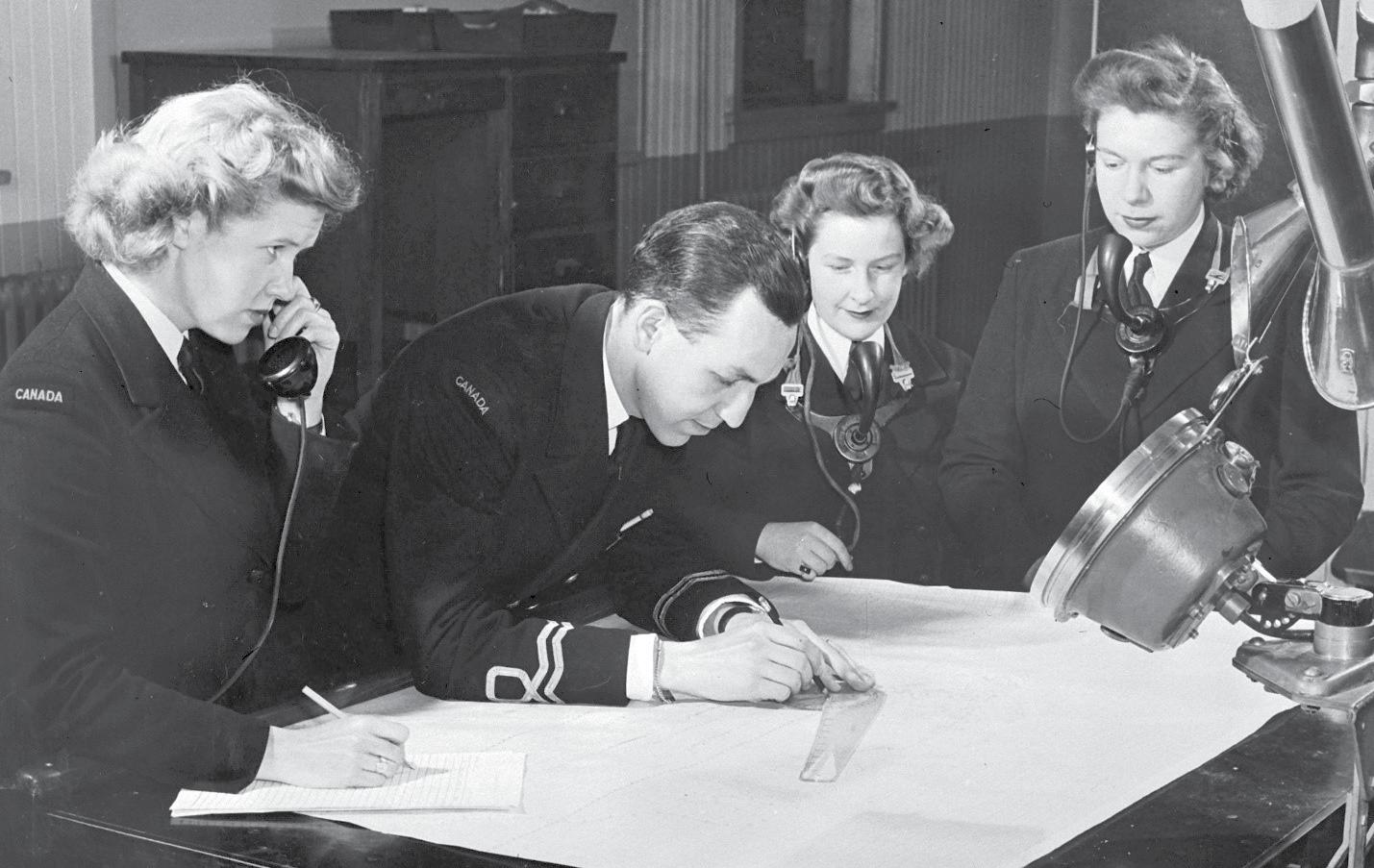

In a wartime radio address aimed at Canadian women 18-45 years old, potential recruits were encouraged to contact their nearest Wren recruiting officer, adding: “You will find them stationed in the R.C.N.V.R. Divisions in all the principal cities of Canada”. Once enlisted, recruits entered a probationary period.
In July 1943, HMCS Chippawa, Winnipeg’s reserve division, was the first unit in Canada to boast having probationary Wrens for part-time preliminary training before they reported to HMCS Conestoga, the WRCNS training facility in Galt, Ont., to complete their basic military training. This first group consisted of three new recruits; by June of the following year, it was reported that thirty probationary Wrens were in training at Chippawa as cooks and stewards, as well as learning drill.
Even with basic training complete, drill and additional training continued for Wrens drafted to NRDs. They would also ply their trade in support of their unit
and the RCN. Some of the trades in which Wrens contributed included serving as writers, telephone operators, messengers, postal clerks, pay writers, cooks and stewards. In December 1943, HMCS Prevost in London, Ont., welcomed two new Wrens, one a clothing supply assistant and the other a victualing supply assistant, bringing their crew of Wrens to six.
Beyond their military duties, Wrens also participated in organizing frequent dances and Victory Loan fundraising, and partook in various inter-divisional and inter-service team and individual sports including basketball, baseball, archery, curling, and swimming.



In the spirit of friendly competition, regattas also presented the opportunity to show off athletic prowess. During the 1943 York Regatta Day hosted by Toronto’s NRD HMCS York, two Wren whaler crews from the division made RCN history: spectators saw, for the first time, crews of Wrens matching strokes and were duly impressed with the accomplished manner in which the Sailorettes handled the long blades.
The location of a number of NRDs near navigable waterways meant that Wrens serving in those units could learn to row whalers and other watercraft, as was the case with the dozens of Wrens barracked in Ottawa at HMCS Carleton
As the Second World War came to a close so too did a chapter of Canadian naval history when the WRCNS was disbanded in 1946. Wartime Wrens made the transition to civilian life and, for the next few years, Canada’s Navy was once again all-male.
Similar to the Second World War, the Korean War (1950-53) and Cold War era put immense pressure on Canada’s Armed Forces to fulfill military commitments. As the demand for labour grew, the value of women contributing to the military workforce again became apparent. In May 1951, authority was granted by the Canadian Parliament to recruit up to 500 women into the Royal Canadian Navy (Reserve) (RCN(R)). No longer a separate service, these post-war Wrens were now full members of the Naval Reserve, and for the first time received the same pay as their male counterparts.
Wrens from NRDs across the country completed their entry training at HMCS Cornwallis in Deep Brook, N.S. Many served full-time on Continuous Naval Duty in trades largely supporting administration, supply and communications branches. They administered their own mess at their training establishment, and sporting activities and competitions continued to play an important part of their service.
Wrens did not yet serve at sea. However, those attached to the Halifax NRD, HMCS Scotian, had an advantage over their sisters in most other divisions in that they are able to acquire some sea-time for themselves. Along with other reserves from the division, Wrens are embarked in Scotian’s training tender, the minesweeper Brockville, for oneday training trips.
A new opportunity for Canada’s Naval Reserve servicewomen presented itself in 1955 when Cabinet approved women enlisting as Regular Force members in the RCN. While many Wrens transferred to the Regular Force, women also continued to enlist in the Naval Reserve; today they account for more than 22 per cent of our Naval Reservists. A century after the creation of Canada’s Naval Reserve in which they were excluded, women now form an integral part of the RCN, both as Regular Force and Reserve Force members.
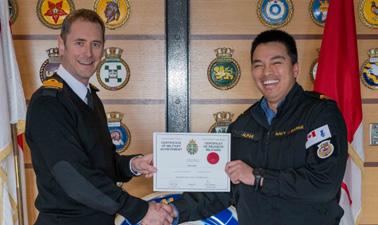
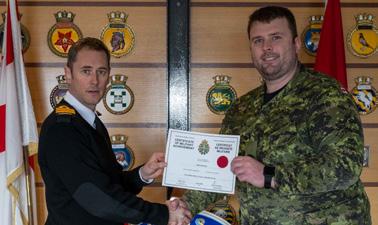
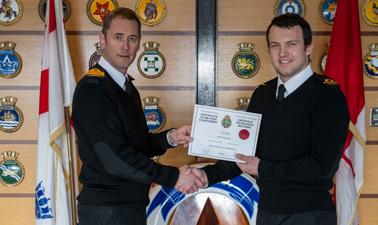

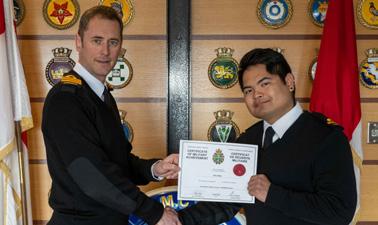
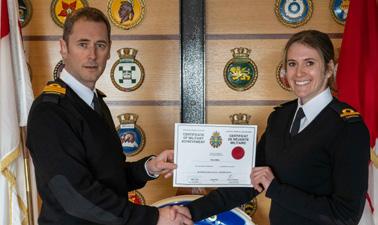
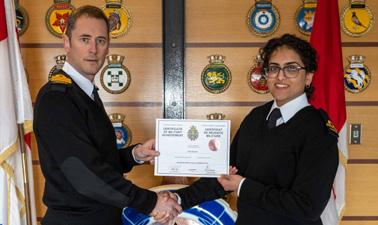

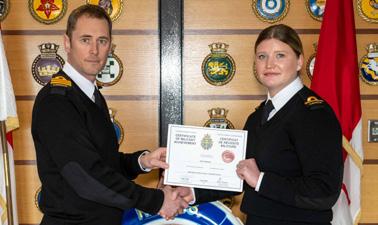
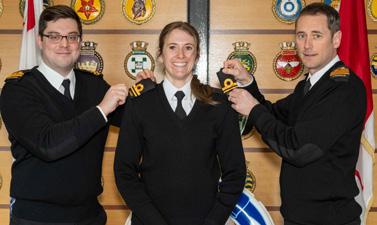
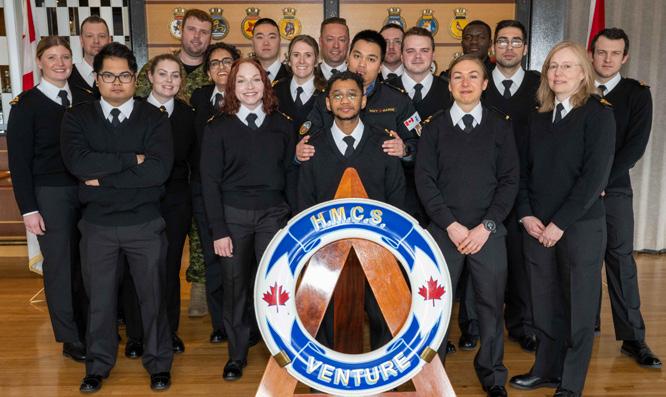

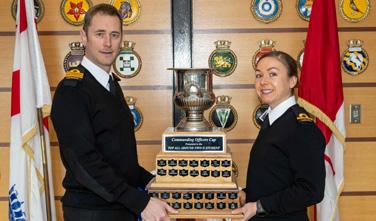



Commander Mike Stefanson, Commanding Officer of HMCS Venture, presented certificates and promotions on Apr. 4 at the Nixon Building.
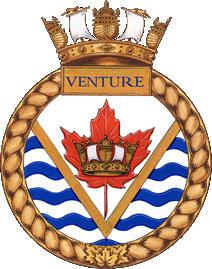
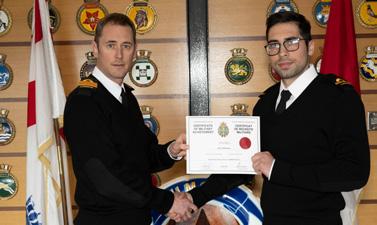
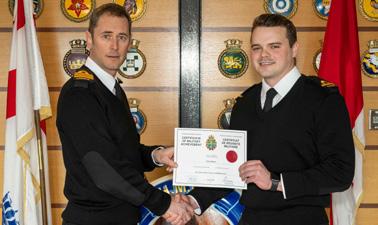
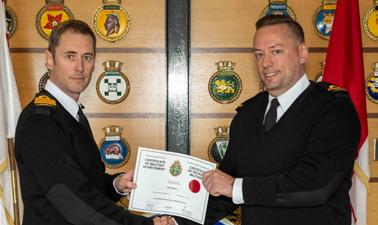
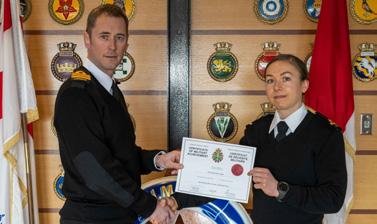
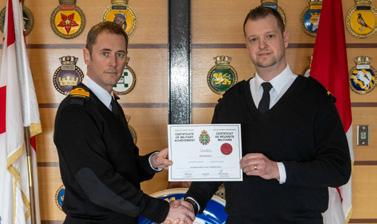

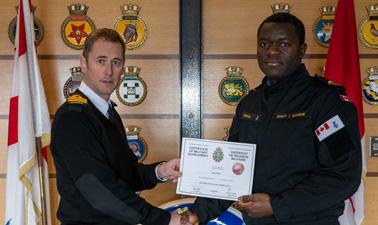

You can never fully prepare yourself for a deployment as a spouse. It is exhausting, lonely, long and can present challenges that you can’t begin to imagine. But it isn’t all gloom and doom. There are opportunities to learn and try things you wouldn’t have otherwise attempted. Deployments are what you make of them. I have now experienced three deployments as a military spouse, and while each was different, my experiences from each one has taught me tactics to make our lives easier and more fun. Don’t wait to do all the fun things when our loved ones are back from deployment, don’t put life on hold or attempt to freeze time. These are a waste of your time and energy. My advice is to try to look at a deployment as an opportunity, a chance to do things differently, learn about yourself and overcome challenges. It can be a rollercoaster – be one of the people that get on, scream and laugh, not one that watches everyone else having fun.
Know & understand the deployment cycle
Knowing and understanding the deployment cycle really helps make sense of your thoughts and feelings. It also made me realize this was ‘normal’ and a part of the process. Attend deployment sessions
Knowledge is power. Going to sessions and getting factual information is essential. Avoid listening to gossip and rumours as they are seldom based in reality and usually only serve to stress you out.
Make a communication plan
Deployments sometimes feel as though they are endless. When they do end, you want to feel as though you connected during deployment. I wrote an email a day. I sent pictures every week. I knew it was a great way to connect and let my husband know the little and big things that were happening. Ensure that you know what to expect in terms of communication so that you aren’t left feeling forgotten or unloved.
Ensure you know your home
This may sound silly, but it is a fact that something always breaks or goes horribly wrong once they are deployed! Know the location of shut off valves, insurance information, billing information, company contact information, etc. For each deployment, I feel like never had enough or updated information, and this just added to the stress and frustration!
Be organized: Chaos = Stress
Be smart with finances
We learned this the hard way. We were so excited about all the extra money we would be getting that we went right out and got a new car. There were many unforeseen expenses during deployment that we ended up being in debt! Having debt to deal with on top of everything else makes life a lot more challenging. Wait and talk explicitly about how you want to spend it.
Make yourself a priority
When you are happy, you can better manage what life throws your way, be more compassionate and understanding, and you make those around you happier. Be selfish sometimes and make no apologies for it. Take time for yourself, have a ‘selfish’ day, go to the spa, spend the day in your PJ’s, etc.
Ask for help and when people offer it, say ‘Yes’
I am sure we could all manage without help, but you want to do more than survive. You want to have some time and energy left for having fun and doing things that renew you, too. People feel wanted, valued and useful when they help others, and you will feel supported and a lot less tired.
Put a calendar in the kitchen and mark everyone’s commitments, activities, holidays, etc. Make a meal plan for the week which can make life easier in the evenings. I bought baskets for organising everyone’s things at the front door so that I don’t climb over a mountain of objects or am unable to find a hat or keys. Try to grocery shop in bulk and, hopefully, this will reduce the number of times you have to go to the grocery store.
Most of us rarely get the recommended amount of sleep. When I am well-rested, I am more patient, happier, a nicer person to be around, I eat less and feel soooo much better. Turn off electronics, don’t eat or drink past 8 p.m., and make getting a full night’s sleep important.
Find something fun or funny every day. Deployments are tough and frustrating at time and it can be hard to see the positive side of things sometimes.Finding something that made you laugh or smile will change your focus and, ultimately, how you see the world. Life is short, kids grow fast, and things can change in a second. Commit to spending time each day finding joy.
Article courtesy of Canadian Military Family Magazine cmfmag.ca




conducted monthly Awards and Presentations Apr. 13 and Apr. 17:


Commander Maude Ouellet-Savard, NFS(P) Commandant presented the following:
PROMOTIONS:
Chief Petty Officer Second Class Owen Demarce promoted to current rank
Petty Officer First Class Nicholas Barrett promoted to current rank
Petty Officer First Class Matthew Childs promoted to current rank
Petty Officer First Class Justin Gaudet promoted to current rank



Petty Officer Second Class Julien Lacasse promoted to current rank
Petty Officer Second Class Christopher Berti promoted to current rank
Master Sailor Logan Wakefield promoted to current rank
AWARDS:

Chief Petty Officer Second Class David Blanchard awarded Canadian Forces Decoration
Petty Officer Second Class Michael Masse awarded Canadian Forces Decoration
Petty Officer Second Class Rex Dela Rosa awarded Canadian Forces Decoration
Petty Officer Second Class Randy Price awarded Canadian Forces Decoration
Petty Officer Second Class Richard Charland awarded Canadian Forces Decoration
Petty Officer Second Class Christopher Campbell awarded Certificate for Level 3 of the Canadian Armed Forces Instructor Development Program
Master Sailor Christina Blaney awarded Canadian Forces Decoration
Master Sailor Julien Lacasse awarded Canadian Forces Decoration
Master Sailor Jonathan Barrette awarded NFS(P) Commandant BZ
Master Sailor Craig Rautenstrauch awarded SAC pin
Sailor First Class Harry Clements awarded Special Service Medal Expedition
Until June 9 / Jusqu’au 9 juin : $40.00


Until June 9 / Jusqu’au 9 juin :

– Active and Retired Military / Militaires en activité et retraités































































































































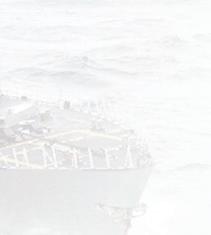
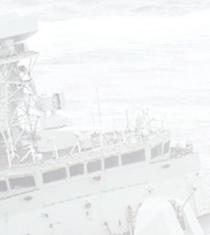

– DND/NPF Civilians / Civils du MDN/FNP










– General Public / Grand public



































Registration not required for the Kid’s Fun Run, however, sign up online to secure your technical t-shirt!



L’inscription n’est pas nécessaire pour la course amusante, cependant, inscrivez-vous en ligne pour obtenir votre t-shirt technique!




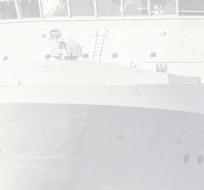




REGISTER TODAY TO SECURE YOUR 2023 NAVY RUN TECHNICAL SHIRT! INSCRIVEZ-VOUS DÈS AUJOURD’HUI POUR RECEVOIR





























LE CHANDAIL TECHNIQUE DE LA COURSE DE LA MARINE 2023!
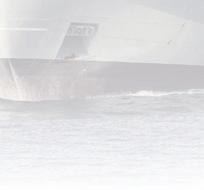




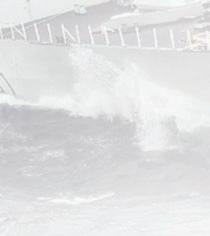
One of the biggest challenges for Royal Canadian Air Force (RCAF) spouses is finding meaningful and relevant employment whenever they move. Some spouses are embracing new, out-of-the-box ways to earn money or free products in their spare time. One such spouse, Kelly-Lynn Nicole of Comox, B.C., mother to five children (including triplets) under seven, recently became an Instagram influencer, which suits her busy lifestyle.
Here is Kelly-Lynn in her own words:
I had heard about becoming a partner for a large online women’s undergarment company, so, after a bit of research, I decided I would apply. The company promotes body positivity and body inclusiveness. The products are designed for comfort and to boost confidence. After owning a few of their products and being satisfied with their quality, it was a perfect fit.
In addition, I noticed CANEX was holding an online ambassador application campaign. I had been to a few CANEX stores, having grown up with a father in the military, being posted numerous times and then becoming a military wife. It was a place I supported as they support Canadian Armed Forces personnel and families.

Social marketing and selling is huge right now. ‘Influencers’, as they call us, have opportunities to make a living by mentioning product names and posting reviews on our platforms. I wouldn’t call myself an influencer on that level. I’m humble about what comes my way and grateful for these opportunities because they come with many benefits:
• I have the opportunity to make commission off sales. I can be paid simply to advertise. I have also been paid through having my videos promoted through even bigger companies.

• I can receive free product in exchange for advertising and content. Content being photos, videos and blog posts, to name a few.
• I can give friends, family and your following discounts, deals and coupons.
• I can meet new friends and become a part of a community. I may even have the opportunity to travel with/for brands.
Fulfilment: It’s a win-win for anyone interested in pursuing this type of thing, if it’s something they are happy about promoting and having fun with. It’s a creative outlet for me and something I can do from home.

It is perfect for military spouses because it’s a job you can do anywhere.
It works for me in a way that, while having fun promoting things I believe in, such as a fantastic one-stop-shop for CAF members that has your back, or a female-owned brand that supports body positivity, I can contribute a little with income, and enjoy products the brands have to offer, all from the comfort of my home with my family.
Kelly-Anne’s husband Dan is a flight engineer with 442 Transport and Rescue Squadron at 19 Wing Comox.
You can find Kelly-Lynn on Instagram @keldandom and at youtube.com/2kellydan
Is your child moving to a new school? Are you returning form an OUTCAN posting? Do you need specialized academic support for your children? If you’re a member of a Canadian Armed Forces family, then we can help you navigate your unique educational pathway.

Interested in sharing your perspective, experiences, or expertise with the Navy and extended Defence community?
Military and civilian writers wanted.
If interested, please reach out to Kateryna.Bandura@forces.gc.ca

DND
Continuous improvement is key to remaining effective in any type of training environment; Basic Military Qualification (BMQ) is no exception.
In 2021, the Canadian Forces Leadership and Recruit School conducted a review of basic training for the Canadian Armed Forces (CAF). The review sought to align the BMQ more effectively with the updated Non-Commission Member General Specification (NCMGS) policy.
The BMQ course, centered on four pillars, has been optimized and revised to include the essential learning elements required to move through each stage of training. The 8-week BMQ course applies updated training approaches and technological advancements, which enable candidates to complete the training in a reduced amount of time while simultaneously improving the quality of their learning experience.
PILLAR ONE: PROFESSIONAL CONDUCT
This pillar uses the flipped-classroom model, where candidates apply the information from their pre-learning activities to case studies and guided discussions based on real-world scenarios. Candidates explore complex issues under guidance of their instructor, receiving immediate feedback on both positive and negative behaviours demonstrated throughout the course.
PILLAR TWO: RESILIENCY

This pillar includes formal training on stress management and resiliency techniques informed by the Road to Mental Readiness and weekly guided discussions where candidates share obstacles and successes experienced on course and strategies to prepare for challenges in the upcoming week. It carries a sports psychology approach and includes a performance journal with questions to help candidates reflect and recognize factors that contributed to their performance and manage setbacks.
PILLAR THREE: PHYSICAL FITNESS
This pillar encourages a healthy lifestyle through daily physical activity while respecting the current fitness level of candidates. Upon arrival, candidates complete an initial fitness screening test based on the FORCE evaluation requirements. Candidates who cannot complete it are removed from training and given a personal fitness training program under the supervision of Personnel Support Programs staff. The course schedule deliberately times the high intensity physical fitness classes and training activities to balance them with low-intensity recovery classes that focus on stretching and mobility.
PILLAR FOUR: MILITARY SKILLS
The redesigned BMQ course prepares graduates with the entrylevel knowledge, skills, resources, and strategies to be successful in their next phases of training, while also providing a strong foundation in core military skills, including drill, weapon handling, first aid, chemical/biological/radiological/nuclear techniques, and more.
This reinvigorated and optimized version of basic training will lead the way to military service for a new generation of Canadians who will be dedicated and trusted to serve.
In partnership with the Defence Advisory Groups and the Director Anti-Racism Implementation, we are pleased to announce the call for nominations for the second cohort of the Office of the Chief Human Resources Officer (OCHRO) / Centre on Diversity and Inclusion (CDI) Mosaic Leadership Development Program, set to begin in June 2023.
We are currently accepting applications from equity-seeking employees interested in participating in this 15-month long program that aims to remove barriers for diverse communities and develop future leaders.
THE MOSAIC LEADERSHIP DEVELOPMENT PROGRAM:
• is a program for increasing diversity in leadership positions;
• is a federal public service-wide program;
• includes sponsorship, learning and experience-building components;
• provides assignments or secondment opportunities for participants; and
• provides successful participants an assessment for a potential appointment to an EX-01 position.
• Employees who have occupied a substantive position equivalent to EX minus 1 for at least one year;
• Employees who have neither qualified on an EX-01 process nor are currently in an EX-pool (Mosaic is centered on developing the skills and abilities related to the Key Leadership Competences for executives; those that are already in an EX-01 pool have already demonstrated these); and
• Employees who self-declare as a member of an equity-seeking group*. Employees do not need to have identified this prior, but self-declaration is required to apply to Mosaic.
* Equity-seeking groups, for the purposes of Mosaic, means the four Employment Equity groups – women, Indigenous Peoples, members of visible minorities, and persons with a disability – subgroups within these four, and 2SLGBTQI+ communities.
All applications received by the deadline below will be reviewed in consultation with the Defence Advisory Groups and the Director Anti-Racism Implementation teams.
Two eligible candidates will be nominated to the OCHRO / CDI. Once submitted, the OCHRO / CDI selection committee will choose approximately 50 participants from the lists of nominees received from across the public service.
Please send the completed application package to the Director Civilian Executive Services (ExecutiveServices-Servicesauxcadressuperieurs@forces.gc.ca) before Apr. 28.
We are committed to providing an inclusive and barrier-free work environment. Interested employees who need to be accommodated during any phase of the nomination process are invited to contact Director Civilian Executive Services to request specialized accommodations. All information received in relation to accommodations will be kept confidential.
If you have any questions or want more information, please contact Director Civilian Executive Services

DND
In 2021, Veterans Affairs Canada announced a 10-year forest conservation initiative at the Canadian National Vimy Memorial and the Beaumont-Hamel Newfoundland Memorial in France.
As part of the project, we will plant around 3,000-4,000 trees per year at Canada’s First World War memorials to ensure the sustainability of the commemorative sites for future generations.
As part of the first planting cycle that kicked off the 10-year initiative, we already planted 641 new trees at Vimy.
In the fall of 2022, we began the second cycle of tree planting at the commemorative sites.

THE FIRST STEP: DE-MINING
It took two weeks to complete the de-mining process—a crucial step that includes detection of ammunition and potential explosives from the First World War.
More often than not, Florian Debacker—the lead de-miner for Deminetec—and his team find First World War remnants throughout the former battlefields.
“Due to its weight and mode of firing, the ammunition is generally found at characteristic depths,” Debacker said. “On this site, a safety depth of 50cm was required, which explains the discoveries of German defensive grenades and 3-inch stoke mortar shells. If greater depth had been requested, we would have begun to discover artillery shells with greater and greater caliber.”
After the de-mining process comes the planting of the trees.

Pascal Fourmy is the head gardener for the Commonwealth War Graves Commission at Vimy and is responsible for the planting of over 2,000 trees during this phase of the project.
This is especially important to Fourmy – not only for the commemorative aspect, but to conserve and revitalize the forest at Vimy.
“The forest is a very important part of Canada’s National Vimy Memorial site,” he said. “If we continue to plant every year, it will regenerate the forest and we will continue to enjoy it for a long time come. I am happy to be able to participate in this project.”
The work will continue over the coming years – the team will prepare the ground for the next cycle of planting, and will plant approximately 3,500 trees in late 2023. A final number of trees after the 10-year initiative is unknown, as planting cycles are determined by a forest management plan – but it’s evident the forests at Vimy and Beaumont-Hamel will be revitalized for years to come.
For decades, millions of Canadians and people around the world have visited these sites of remembrance. Like the monuments themselves, the forests that surround them are a powerful symbol—a living reminder of those we’ve lost.
Screening of the film, Corvette Port Arthur directed by Joris Ivens, National Film Board, 1943

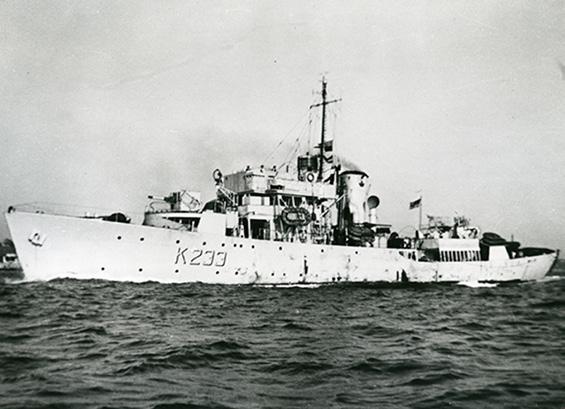
If we don’t replant,

